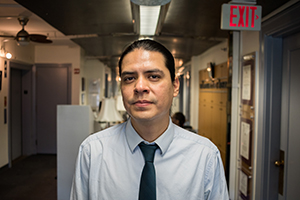Communications
Unanswered Questions Draw Journalist to El Salvador as AU-Pulitzer Fellow

In 2017, Kristian Hernandez worked at The Monitor, the largest newspaper south of San Antonio, as a court reporter and later a night cops reporter. However, during his time at the paper, he began to create an unofficial immigration beat where he focused on migrant deaths. He said he picked this topic because no one was focusing on these deaths and “people are dying, and nobody knows their names.” With the help of the nonprofit organization Angels in the Desert, Hernandez helped recover two bodies that were identified and returned to their families.
In 2019, after a year spent earning his Master’s in Journalism and Public Affairs at American University School of Communication (AU SOC), he plans to travel to El Salvador to visit the families and gravesites of the two people he helped to identify. He will film and report on the trip as a documentary project for the Pulitzer Crisis Center, where he is the 2018-19 SOC AU fellow.
It was another fellowship that brought Hernandez to SOC and to the Center for Public Integrity. He said he was drawn to the organization, which was founded by SOC professor Charles Lewis, because it is one of few nonprofit investigative journalism organizations in America. His goal was to develop the skills to research and help understand the failures that have led to violence and death at the US/ Mexico border. He wanted to cover immigration because he said he felt no one reports the full truth. The topic is very personal to Hernandez because he grew up on both sides of the border and he wanted to cover stories of his people.
As part of his degree work at SOC, he took classes with professors Jennifer LaFleur and Bill Gentile, among others. LaFleur’s class on data journalism prepared him for his work in the Washington Post Practicum, where he was embedded with the investigative team researching murders for which no arrests were made. His background allowed him to create databases of the locations of murders that would be turned into interactive maps.
“Sitting with [Washington Post investigative reporters] Kimbriell Kelly and Scott Higham … they are so excited about their jobs and it’s so inspiring. It’s real work. I am contributing to their project, building databases for them,” said Hernandez.
Hernandez says the classes he took with professor Gentile, “Backpack Journalism” and “Foreign Correspondents,” gave him unparalleled insight into the industry. He credits the course with developing the skills he used to develop the investigative story pitch that earned him the Pulitzer Crisis Center Student Fellowship.
The Pulitzer Center Fellowship offers access to mentorships and expertise to help fellows as they develop their story pitches into production plans and finally, media practices to travel to countries and cover untold stories. Returning to his work uncovering stories about migrant deaths at the US/ Mexico border, he will look for closure by meeting the families of the people he had helped to identify as a reporter in Texas, and explore the policies on both sides of the border that led to their deaths.
